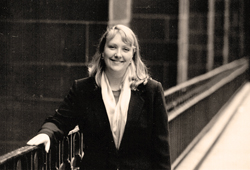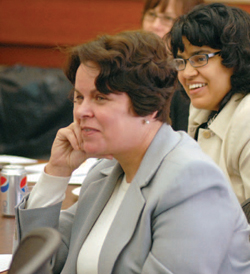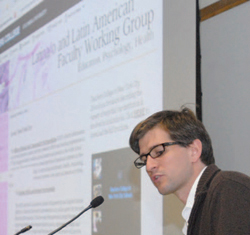Leading Latino Research
A new TC faculty working group is bringing greater visibility to educating Hispanics in the United States
When Regina Cortina, Associate Professor of Education, joined the Teachers College faculty in the fall of 2007, she was already an established scholar, known for her research on gender equity and education among girls and women in Latin America .
Eager to get a sense of the kind of research being done by her new colleagues at TC on Latinos—in the United States
“I typed in the word Latino and basically didn’t get anything,” she says. “The only thing that showed up was a study by Professor Francisco Rivera-Batiz, and that was from 2004. So I said to myself, ‘That’s not going to work.’”
A year and a half after Cortina’s initial Web search and, thanks in large measure to her efforts, things have changed. Prompted by the lack of visibility of Latino research at TC, Cortina and TC colleague Lesley Bartlett, Assistant Professor of Education, put together a proposal for seed funding from the Provost Opportunity Fund in the fall of 2007 to establish the Latina/o and Latin American Faculty Working Group that now numbers more than 25 faculty, students and administrators.
The reality, Cortina says, is that there are actually a number of faculty members doing research on Latinos at TC and even more on issues that affect them. However, their work simply wasn’t unified and accessible. So Cortina and Bartlett set out to change things, first by bringing faculty and students together to share their research through the working group, and then establishing an online presence (www.tc.edu/latino-ed) on the College’s Web site that she hopes will evolve over time into a clearinghouse for TC research on Latinos.
“The research just was not easily available to people,” Cortina says. “If you were looking for it on the Web site, you’d have to do a tremendous amount of work. Now, at least, it’s in one place.”
Over the course of the academic year, the working group has met periodically to hear presentations from faculty ranging from Assistant Professor Christopher Emdin on his work, with students in the Bronx and Harlem , to Associate Professor Michelle Knight on Latino critical theory.
In addition, the group launched a speaker series that to date has brought three prominent education scholars to TC to discuss Latino education, often in conjunction with the Working Group on Latin American Migration, a separate initiative Cortina helped organize with professors at Columbia and New York University
For Nicolas Stahelin, a doctoral student in international development, the potential of the working group was made clear when it hosted the first speaker in the series, Gates Foundation Program Officer Gilberto Conchas. More than 80 faculty members, students and staff packed the conference room at 179 Grace Dodge Hall to hear the presentation.
“But what was most special for me was when we had the reception after Gilberto Conchas’ talk, I saw both students and professors having a chance to really talk for the first time about how much their work had in common,” says Stahelin, who developed the working group’s Web site. “TC is a big institution, and it’s easy to lose track of what other people are doing, but once you get students and faculty talking, they can see how much, through collaboration, they can enhance and strengthen each other’s work. The working group, I think, can help nurture and promote those discussions.”
In addition to creating a forum for faculty research on Latino issues and increasing the visibility of that work both within and outside the institution, Cortina said a third focus—an area that the group has invested much time discussing—is increasing the number of Latino students at TC.
The working group has sought to make a strong case for a more aggressive recruitment and enrollment of Latino students by focusing on TC’s increasing commitment to working with Harlem public schools.
“Many of those schools have high levels of Latino students,” Cortina says. “We need to train the students who can serve these communities and schools. We have the programs in bilingual school psychology, bilingual speech pathology and in bilingual/bicultural education. These are high-need areas, but the reality is that we don’t have the Latino students. We need to find more funding for these students so they can come to TC, and I think the working group can serve as a support structure when they come here.”
Published Monday, Jun. 1, 2009


